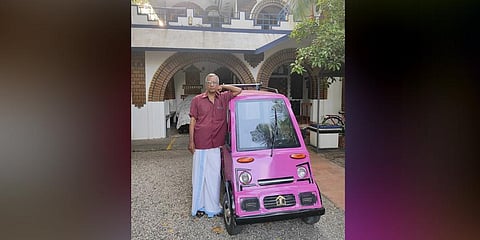

KOCHI: Antony John, 67, is a career consultant by profession and an advocate of eco-friendly products. Unlike armchair activists these days who love to preach, he has actually come up with innovative ideas that can bring about a change — like a bio-composting system and a hydroponic vertical garden. A self-proclaimed environmentalist, Antony was riding an electric scooter for the past 16 years. Recently, he switched to a self-made electric car. “I’m turning old. So I wanted a vehicle that would protect me from the sun and rain. Ideally, it had to be for one person and electric,” he says.
When the idea to make a car happened to him, Antony spent many days researching it. He came across a French car online. The aerodynamic model caught his interest. Keeping his requirements in mind, Antony made a few alterations to the design and developed a plan. He then shared his idea with a worker at an automobile body building workshop near his house. “Vishwanathan mesthiri agreed to make the body of the vehicle using the rust-free Japan sheet. The altered steering system is borrowed from Tata Nano, and the electric components were sourced from Delhi,” says Antony. The car took a year to complete.
The bright pink vehicle looks like it is right out of an animated movie, and has a fan base of its own now. While on-road, it does turn many heads followed by a dozen queries. With just an accelerator and a brake, the car runs smoothly on the tyres of a Bajaj autorickshaw. When fully charged, the battery can easily run for 60km. “At first, I made a miscalculation. For the 150 kg car, I used a 20 AH battery. This only gave a 12km mileage. I needed 15km to travel to and from my office. Considering the weight and the distance to be covered, I, then sourced a 52 AH Lithium Ferro Phosphate battery. This wouldn’t catch fire either, unlike the previous Lithium iron one,” says Antony.
Though the overall cost of the car was around Rs 4 lakh — way more affordable than electric vehicles in the market — Antony claims that it needs no maintenance. The running cost is also minimal. “The car only uses up one unit of current, which costs Rs 5. It is cost-effective. Such vehicles can end the misery we experience with the constant hike in fuel prices,” he says. The 33-inch wide vehicle can go through even narrow roads like a two-wheeler. “It also takes up very little parking space,” adds Antony.
The car has a battery, motor and controller. When started, the controller will draw power from a battery, which is then supplied to the motor. The self-made vehicle has a speed of 25km per hour and it is legally cleared for use on roads. “Though the vehicle was a hit on social media, many judged it might be unsafe for use. Why do you think I spent lakhs of rupees on a car? Before even manufacturing it, I study the legal aspect of using one. As per the Central Motor Vehicle Rule 2005, an electric vehicle with a maximum speed of 25km is considered as a bicycle and is exempt from all the formalities of registration and road tax,” he says. “The digital meter on the vehicle shows the speed and remaining battery level. It also senses any obstacles when the car is going reverse. It also calculates the safe distance,” he says.
The compact vehicle is named ‘Pulkoodu’, after Antony’s house name. The car also flaunts a headlight, fog light, indicator and front and back wipers. Antony is now working on a vehicle that is more affordable for the common man.
“Many had asked me to make a similar car for them. But as soon as they hear about how much it costs, they back out. So, now I am trying to make a model that is even more low-cost,” concludes Antony.